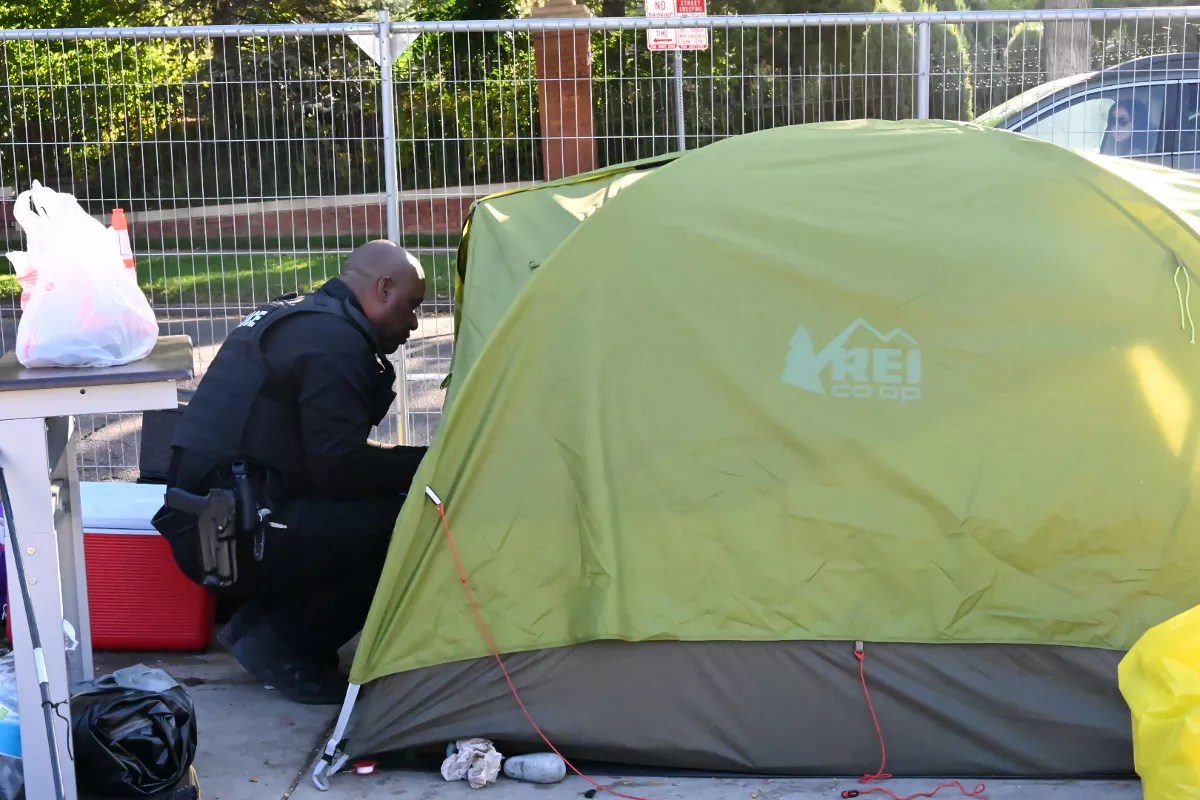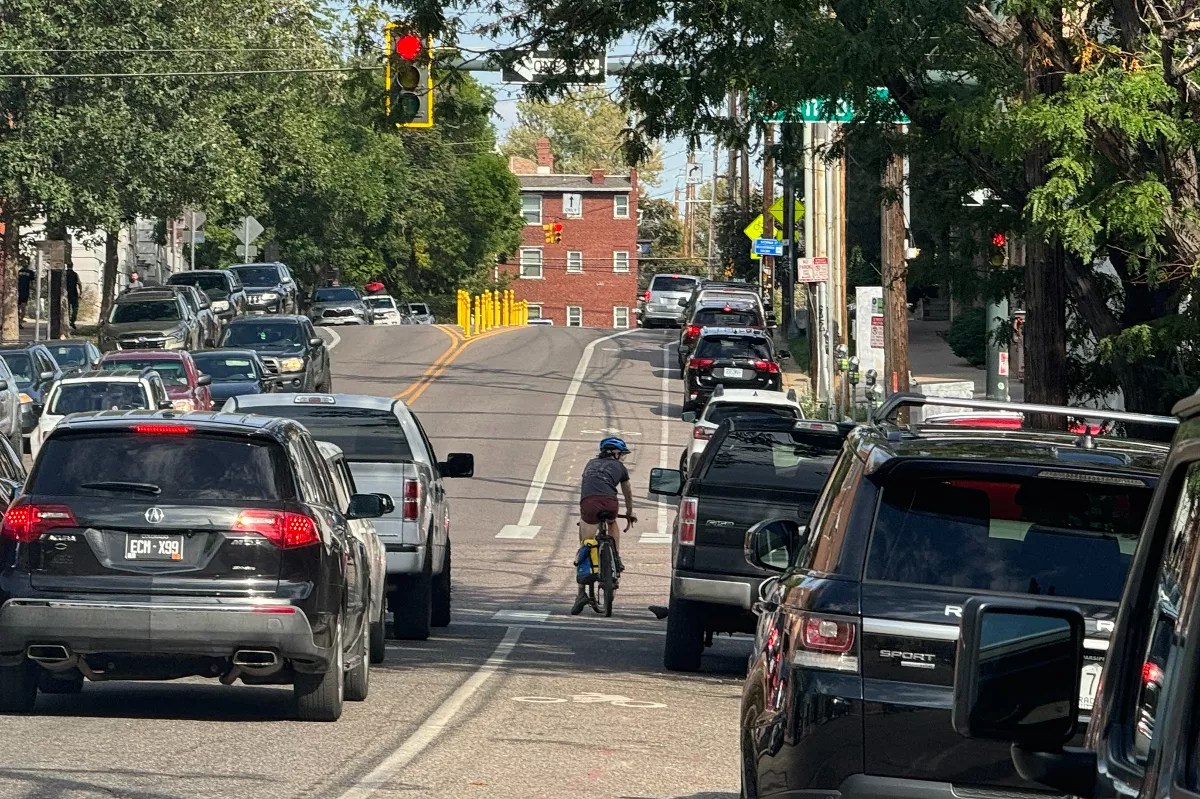
Bennito L. Kelty

Audio By Carbonatix
Homelessness and affordable housing are among the top issues stressing Denver residents as Mayor Mike Johnston slips slightly in favorability, according to a new survey by the Colorado Polling Institute (CPI).
A bipartisan team from the consulting firms Aspect Strategic and New Bridge Strategy conducted the survey for the CPI, a nonprofit that launched in 2013. The team surveyed 417 voters living in Denver for a week in mid-August over the phone and online. It’s a small sample size of the 700,000 people living in the city of Denver, but Kevin Ingham, a consultant from Aspect Strategic, says they tried to recreate Denver’s demographics.
“Some things that make Denver unique is that compared to the rest of the state, it is quite young for a mid-term electorate, it is more diverse than the state as a whole, and it is very well educated,” Ingham said. “It’s also a very democratically leaning city, with nearly half the voters who are going to turn out for the midterm elections being registered Democrats.”
Most of the respondents were registered Democrats (48 percent), white (70 percent) and have some college or a college degree (86 percent), according to CPI. About 42 percent were unaffiliated or registered as Independent while 10 percent were Republican.
About 61 percent of participants were homeowners, and 34 percent were renters. The ages were split up pretty evenly, with 29 percent between eighteen and 34 years old, 39 percent between 35 and 54, and 31 percent over 55 years old.
Overall, the poll’s respondents were optimistic about how Denver is doing, with 51 percent saying that the city is moving in the right direction and 41 percent saying it’s on the wrong track, while 7 percent weren’t sure or didn’t respond. According to Ingham, “we’ve seen a small but steady trend towards optimism” as just about 44 percent said Denver was moving in the right direction in 2023.
But 51 percent is still a very slight majority, and Denver’s future is still complicated, according to poll results. See more highlights below.
Homelessness, Affordable Housing Are Top Issues
Homelessness and affordable housing are by far the most important issues in Denver, the most recent CPI shows. When asked, “What are the most important issues for Denver city government to address?” homelessness/encampments and affordable housing were selected by a combined 74 percent of respondents, who were allowed multiple responses.
Johnston ran on the promise of solving homelessness in his first year, and about 52 percent of respondents said he’s making progress to that end. About 47 percent said he’s not making progress, while 1 percent didn’t know.
About 83 percent of respondents agreed that there isn’t enough housing for people with low incomes, and 76 percent agreed there isn’t enough for moderate incomes, either. About 53 percent said that Denver has too much housing for people with higher incomes.
Still, 51 percent said that they haven’t thought about moving because of the cost of living, while 41 percent said that too many people are moving to Denver.
Recent polls have consistently found that Colorado residents are worried about the lack of affordable housing. The Pulse Poll released in August found that cost-of-living was the only thing stressing Coloradans out more is President Donald Trump and his government, and the Latino Policy Agenda poll released the same month found that Trump and ICE were the only things concerning Latinos more than affordable housing.

More than a quarter of respondents to the CPI poll said that Denver has too many bike lanes.
Bennito L. Kelty
Bikes!
After homelessness, affordable housing and crime, the next biggest issue for respondents was roads and infrastructure, with 14 percent listing it as one of the top issues for Denver. When asked if Denver has too many, too little or the right amount of bike lanes, the responses were pretty even. About 35 percent said that Denver has the right amount of bike lanes, 36 percent say it needs more and 28 percent said it has too many.
Voters Don’t Trust City Hall, Worry for Businesses
Nearly half of respondents, about 48 percent, told pollsters they’re not confident with how the City of Denver handles taxpayer money, with only 43 saying they were confident and 9 percent unsure. Around 62 percent of particpants said that they were paying too many taxes to the Denver city government.
About 27 percent said that the city government generally “stands in the way of businesses” while only 18 percent said the city was supportive. Approximately 32 percent weren’t sure. while 23 percent said their opinion was mixed. A whopping 87 percent said that it’s gotten too hard to run a small business downtown, but 44 percent said that’s a problem everywhere.
However, people were optimistic that downtown Denver can become an economic engine again. When asked if they were optimistic of downtown Denver’s recovery,” 44 percent said yes while 39 percent were pessimistic.
Construction on East Colfax Avenue for the Bus Rapid Transit line left 38 percent of respondents pessimistic about whether it will be worth the disruption to businesses more worry about closing due to the impact of the project on sales and the lack of city support. Still, slightly more respondents, 39 percent, were optimistic about BRT.

Mayor Johnston lost some love in this year’s CPI poll compared to last year, going from 48 percent in favor of his policies to 46 percent this year.
Bennito L. Kelty
Johnston Support Slips
Now into his second year, the mayor’s marks in favorability decreased from 48 percent last year to 46 percent in August, marking a small drop from his first year in office. Of those who said they had a favorable impression of Johnston this year, about 39 percent said it was because of his efforts to solve homelessness, and 25 percent said that it was for keeping promises.
Another 12 percent said they supported him for his work revitalizing downtown. About 6 percent said that it was because he “stands up to Trump,” while an equal percent credited his community engagement, as the mayor has held dozens of meetings and town halls with residents each of the last two years.
Out of people who saw Johnston unfavorably, the top reasons were overspending or poor planning (25 percent), handling homelessness poorly (20 percent) and taxpayer money going to homelessness or immigration (20 percent).
About 14 percent said they don’t like him because they think downtown is worse, and an equal amount said it’s his “socialist/liberal/progressive policies.” Meanwhile, 12 percent of the CPI said he’s “not up to the job,”around 9 percent mentioned recent mass city layoffs in mid-August.
The majority of total respondents, 51 percent, said that Johnston “started moving things in the right direction but needs to do more” to address the city’s problems, and 7 percent said that he made significant progress in addressing the city’s challenges. About 21 percent said that he hasn’t made any progress, while 19 percent said “he has made things worse.”
About 73 percent said that they had heard little to nothing about Johnston’s Vibrant Denver bond package, an upcoming ballot measure that proposes selling bonds to fund upwards of $950 million worth of public infrastructure and facilities improvements.
Mayor’s Efforts on Specific Issues Seen Differently
Johnston scored better on specific issues, like homelessness, crime and standing up to the Trump administration.
In particular, residents liked what they were seeing with public safety, with 39 percent saying Johnston had made “significant progress” towards making Denver safer and reducing crime. Crime and safety were also named as one of the top issues facing Denver for 26 percent of respondents, and about 71 percent said that they feel safe in the city. Violent crime rates in Denver had a big year-over-year drop in May, according to the Major Cities Chief Association, and homicides and shootings dipped by 6 percent from January to July compared to the same period last year, according to the Denver Police Department.
Johnston went to Washington, D.C., in March to testify before a Republican-led congressional committee after he said he’d stand up to ICE if Trump tried to deport people in Denver, and his appearance won him some support as he defended the city’s response to the influx of migrants in 2023 and 2024. The City of Denver has also filed four lawsuits against the Trump administration to recover and protect funding withheld because of Johnston’s immigration response.
About 38 percent of respondents said that they approved of how Johnston has dealt with the Trump administration, while 30 percent disapproved and the other third “don’t know enough to say.”